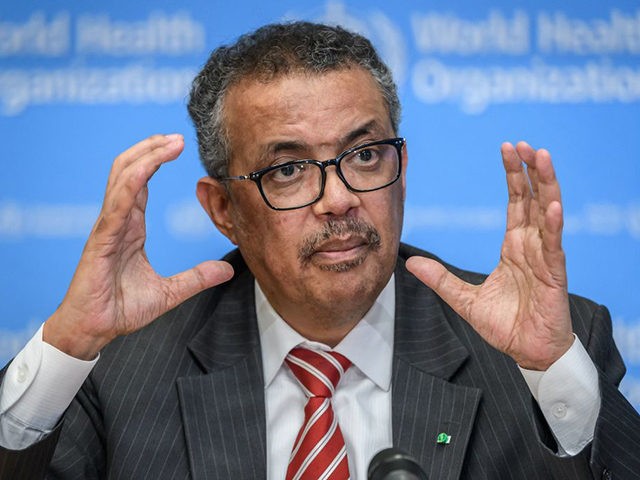World Health Organization (W.H.O.) Director-General Tedros Adhanom Ghebreyesus, who hails from the troubled Tigray region of Ethiopia, on Monday denounced the situation in his home country as “very horrific” due to “rampant” starvation, violence, population displacement, and rape.
Few observers would dispute Tedros’ dire assessment, but there is much dispute over which of the many parties to Ethiopia’s civil war is responsible for unleashing which horror.
“The situation in Tigray, Ethiopia, is, if I use one word, horrific. Very horrific,” the W.H.O. director said at a press conference Monday.
“Many people have started dying actually because of hunger, and severe and acute malnutrition is becoming rampant,” he said. “Rape is rampant. I don’t think there was that scale anywhere else in the world actually.”
“For the most part, we’re not even in a position to discuss about Covid [Chinese coronavirus], to be honest, because there are more pressing issues,” he said when asked about the coronavirus situation in Ethiopia.
Tedros noted Ethiopia’s healthcare system is “not functioning” because most of its facilities have been looted or destroyed and hundreds of thousands of civilians have been displaced by internal warfare, with some 60,000 of them currently taking refuge in Sudan.
The Tigray are one of Ethiopia’s many ethnic subgroups. The Marxist Tigray People’s Liberation Front (TPLF), which counted Tedros as a member, played a major role in overthrowing the communist military dictatorship of Ethiopia in 1991, gaining political influence far out of proportion to its share of the population as a result.
That came to an end with the 2018 election of current Prime Minister Abiy Ahmed, a member of Ethiopia’s largest ethnic group, the Oromo. Abiy was awarded the Nobel Peace Prize in 2019 for improving relations with neighboring Eritrea. Abiy also implemented aggressive domestic government reforms that greatly reduced the influence of Tigray officials, charging many of them with corruption and human rights abuses. The TPLF denounced these investigations as unfair, racially biased, and possibly motivated by “foreign involvement.”
The growing conflict between Abiy’s government and the TPLF became a violent confrontation in November 2020, with ground combat, airstrikes, and exchanges of rocket artillery across the Tigray border. Eritrean forces entered the conflict to fight against the Tigray and allied militias. Although it was not widely reported by international media, another ethnic group called the Amhara took the opportunity to seize disputed territories they claimed the Tigray stole after the 1991 revolution, with support from the Abiy administration.
Allegations of brutality, war crimes, and ethnic cleansing were lodged against all sides, and all sides disputed such charges. The Ethiopian government claimed its military operation Tigray officially ended after a month, but reports of massacres, looting, deliberate starvation, and mass rape continued.
Abiy belatedly admitted Eritrean troops, charged with some of the worst offenses, were deployed in the Tigray region and announced they would withdraw in March. Many Ethiopian refugees in Sudan claim they were abused and killed by “militias,” frequently pointing to a youth militia called Fano that is loyal to the Abiy government, while the government claims a Tigrayan youth militia has been murdering ethnic Amharas. International observers say it is very difficult to determine the veracity of any of these claims.
An even larger cohort of Eritrean refugees — about 100,000 in total — lives in the northern Tigray region, having fled their own abusive authoritarian government long ago. The U.N. reports Eritrean refugee camps have been attacked by pro-TPLF militia groups, including vicious reprisal attacks launched after Tigrayan forces suffered battlefield losses in the November civil war.
Eritrean refugees say they were assaulted, killed, and forcibly starved by Tigrayan militia, treatment they found shocking because they loathe the Eritrean government and viewed the TPLF as an ally against it.
Eritrean troops deployed in Tigray were no more friendly to the Eritrean refugees than the Tigrayan militia were, kidnapping many who have not been seen again. Refugees say they fled their camps to escape violence or were driven out by Eritrean troops with death threats. In March 2021, U.N. humanitarian teams reached two of the Eritrean refugee camps in Tigray and found them “destroyed, looted, and vandalized,” their thousands of occupants “scattered” and in “dire need of assistance.”
Ethiopian government officials in November accused Tedros of “treason” for supporting the Tigray rebels and colluding with their foreign supporters. Some Ethiopian officials grumbled Tedros was one-sided in accusing the government of atrocities without hearing their side of the story, while others went further and accused him of helping the rebels obtain material support, including weapons.
On Friday, the European Union (EU) condemned the Ethiopian government for blocking shipments of urgently-needed humanitarian aid to Tigray.
“The reality on the ground shows that blockades by military forces are severely impeding the ability for assistance to reach rural areas, where the humanitarian crisis is at the worst level,” the EU statement said.
“The use of humanitarian aid as a weapon of war is a grave violation of international humanitarian law and is putting at risk the lives of millions of people. Those responsible for deliberately preventing timely access will be held to account,” the EU warned.
The U.N. confirmed last week that Ethiopian government forces and Eritrean troops — some of them reportedly disguised in Ethiopian uniforms — are blocking humanitarian access to parts of Tigray and looting aid shipments. Widespread malnutrition in the region was exacerbated by the timing of the November conflict, which interrupted a vital harvest right after a massive locust invasion.

COMMENTS
Please let us know if you're having issues with commenting.